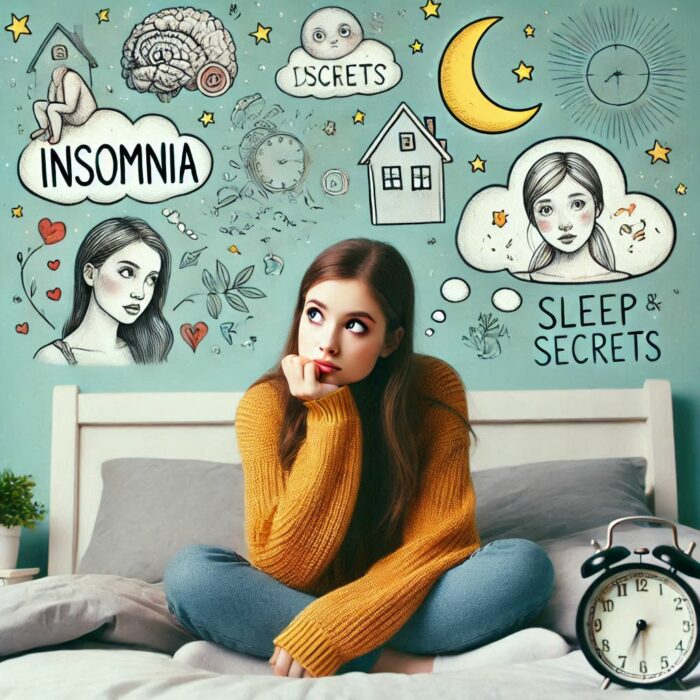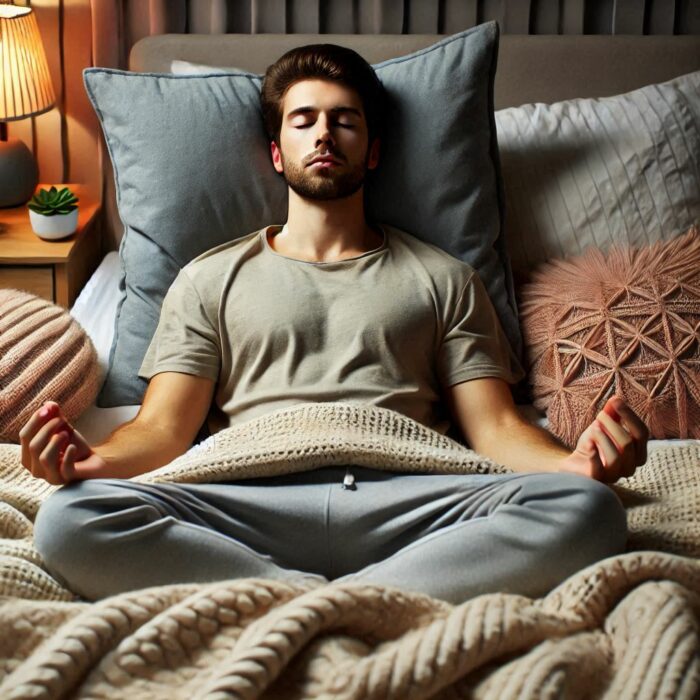
Sleep is not just rest, but an important component of our health and productivity. By learning more interesting things about insomnia, we can find the keys and secrets of sleep to improve the quality of sleep and overall well-being.
According to experts, sleep problems are observed in every third person. Insomnia is defined as the inability to fall asleep or maintain high-quality and long-term sleep, which can manifest itself in frequent awakenings during the night. What factors contribute to the occurrence of insomnia, and what methods and techniques can be used to overcome it? This will be discussed further.
Interesting about insomnia: How many hours of sleep does a person need?
The required amount of sleep varies from person to person. Some people need 3-4 hours of nightly sleep to maintain normal performance and well-being, while most people need much more – an average of 6 to 9 hours. With age, the duration of sleep, as a rule, decreases, which is a normal phenomenon.
What is insomnia?

This concept covers several sleep-related problems:
- Inability to fall asleep,
- Waking up too early,
- Waking up in the middle of the night and having trouble falling back asleep,
- Lack of feeling “fresh” in the morning.
People who suffer from sleep disorders often feel tired during the day and have difficulty concentrating. A person suffering from insomnia may become irritable and unable to perform their work duties.
Depending on the duration, insomnia can be acute (episodic) and chronic. Acute insomnia lasts for a short period and is often associated with life circumstances, such as taking exams or receiving bad news. In most cases, it resolves on its own.
Chronic insomnia develops if a person has sleep problems at least three times a week for at least three months. Changes in the environment, poor sleep hygiene, working a shift schedule, health problems, taking certain medications, and depression can contribute to the development of chronic insomnia. People who suffer from this type of disorder should seek medical help, as non-drug treatments do not always give the desired effect.
What causes insomnia?
There are many factors that contribute to the occurrence of this disorder. The most common of them are discussed below.
Obstructive sleep apnea
This disorder is often observed in people who suffer from snoring during sleep, especially in those who are overweight. In a person with obstructive sleep apnea, the airways narrow, which not only causes snoring, but also reduces the level of oxygen reaching the lungs. To restore normal breathing, the person has to wake up, sometimes several times a night.
Restless legs syndrome
This is another common cause of insomnia. Restless legs syndrome is characterized by a strong urge to move the legs due to unpleasant sensations that are relieved by movement. The unpleasant sensations in the legs occur when the person is at rest, making it difficult to fall asleep.
Anxiety and Depression

People with these disorders often have difficulty falling asleep or waking up frequently during the night. They find it difficult to distract themselves from worrying thoughts related to work, home, or personal problems. Sleep problems can be a symptom of depression, along with other symptoms such as:
- Low mood,
- Loss of interest in previously enjoyable activities,
- Trouble concentrating,
- Emotional instability,
- Persistent negative thoughts.
Treating depression and anxiety can help with insomnia.
Pain
People with chronic pain often have difficulty falling asleep and staying asleep. This is common among patients with arthritis and cancer.
Taking certain medications
Certain medications can interfere with falling asleep and getting quality sleep. These include diuretics, some antidepressants, beta-blockers, and painkillers that contain caffeine.
Stimulants
Stimulants activate the central nervous system and promote alertness. There are three main types of stimulants that negatively affect sleep quality:
- Alcohol – Many people drink alcohol in the evening to relax and help them fall asleep. However, alcohol actually worsens sleep quality and causes them to wake up earlier.
- Caffeine – This substance is found in tea, coffee, cola, and even chocolate. Caffeine is also present in some painkillers and other medications.
- Nicotine – Smoking does not contribute to good sleep, since nicotine, which is contained in cigarettes, is a stimulant.
Sleep Secrets: How to Get Rid of Insomnia Without Medication?
There are four main methods that help you fall asleep faster. And improve the quality of your sleep:
- Maintaining sleep hygiene (observing certain rules and habits).
- Use relaxation techniques.
- Regular exercise.
- Cognitive behavioral therapy.
Sleep hygiene
Following recommendations aimed at forming certain habits often helps to cope with insomnia. Below is a complete list of such recommendations:
- Go to bed only when you feel tired and sleepy.
- Avoid drinks and foods containing caffeine 6-8 hours before bedtime.
- Do not smoke or drink alcohol 6-8 hours before bedtime.
- Avoid overeating and eating “heavy” foods before bedtime; only a light snack is allowed.
- Do not engage in intense physical exercise 4 hours before bedtime.
- Turn off all electronic devices at least 30 minutes before bedtime. Artificial light from laptops, tablets and mobile phones interferes with falling asleep quickly and getting quality sleep.
Follow a sleep
- Follow a sleep routine: go to bed and wake up at the same time, even on weekends. Don’t use your weekends to catch up on your weekday sleep, as this disrupts your sleep pattern. No matter how tired you are, avoid napping during the day.
- Keep your bedroom quiet, dark, and comfortable. Try not to work, eat, or watch TV in the area where you sleep.
- If your bed is old or uncomfortable, consider getting a new one.
- Put your alarm clock or phone out of sight to avoid constantly checking the time, which can interfere with falling asleep.
- Choose a relaxing ritual to follow before bed. This could be an evening walk, followed by a shower, a warm drink (without caffeine), and reading.
- Avoid activities that require psychological and mental strain, such as working on a laptop or studying for exams, for 90 minutes before bedtime.
- Some people find it easier to fall asleep to soothing music. For this, it is recommended to use a player with a 30-minute sleep timer.
- If you can’t fall asleep within 20-30 minutes, get out of bed and, if possible, move to another room. Don’t lie there thinking and waiting impatiently for sleep to come. Instead, read and return to bed when you feel sleepy.
Treating Insomnia Using Relaxation Techniques

The goal of this method is to reduce mental and physical arousal before bedtime. To achieve this goal, breathing exercises are used, as well as progressive muscle relaxation, which helps to fall asleep.
Breathing exercise
It is recommended to perform this exercise daily for 2-3 minutes:
- Take deep and slow breaths through your nose, exhaling calmly through your mouth. Try to make the exhalation twice as long as the inhalation.
- When performing the exercise, focus on the diaphragm, not the upper part of the chest. The diaphragm is a large muscle located under the lungs. With each exhalation, try to consciously relax your shoulders and the muscles of the upper chest, which will allow you to use the diaphragm as much as possible.
Progressive muscle relaxation
Find a quiet and warm place where you will not be disturbed. Lie on your back or sit in a chair with back support if that is more comfortable. Once you have mastered the exercises, do them with your eyes closed.
You will work each muscle group, contracting it as much as possible and then completely relaxing it. Inhale as you contract the muscles and exhale as you relax. At the beginning of the session, focus on your breathing for a few minutes, breathing slowly and calmly, following the recommendations for the breathing exercise. With each exhalation, say the words “peace” or “relaxation” to yourself.
Then proceed to the exercises:
- Forearm – contract the muscles of the forearm of one hand for a few seconds as you inhale. As you exhale, relax the muscles, then repeat the exercise with the other hand.
- Shoulder – bend your arm at the elbow and tense the muscles of the shoulder for a few seconds as you inhale. Relax your muscles as you exhale and repeat the exercise with the other arm.
- Deltoids – raise your shoulder joints as high as possible on an inhale and relax on an exhale.
- Neck – tilt your head back as far as you feel comfortable, then slowly roll it from side to side.
- Facial muscles – frown your eyebrows as low as possible for a few seconds, then relax. Raise your eyebrows (as if you are very surprised) as high as possible and relax. Clench your jaw for a few seconds, then relax.
- Chest muscles – take a deep breath and hold this position for a few seconds. Then relax and breathe normally.
- Abdominal muscles – tighten your abdominal muscles as much as possible, then relax them.
- Buttocks – squeeze your buttocks as much as possible, then relax them.
- Legs – in the starting position, your feet should be on the floor. Bend your legs and toes, pointing them towards your face, then relax.
Repeat the entire circuit of exercises 3-4 times.
How to fight insomnia with regular exercise
Regular exercise or informal physical activity helps to relax and feel sleepy in the evening. If possible, engage in physical activity every day. Even a walk during the day or early evening is beneficial. Ideally, it is recommended to allocate at least 30 minutes for moderate-intensity exercise. Doing it 5 or more days a week.
You don’t have to go to the gym. Brisk walking, jogging, cycling, climbing stairs, dancing are all excellent options for physical activity. Heavy housework and gardening can also replace a full workout. However, it is important to remember that intense exercise or heavy physical work should not be done within 4 hours of bedtime.
Cognitive behavioral therapy

Cognitive behavioral therapy is one of the most effective methods of combating insomnia. It is a structured program aimed at identifying. Replacing thoughts and behaviors that worsen the quality of sleep. Unlike drug treatment, cognitive behavioral therapy helps not only to temporarily get rid of insomnia. But also to cope with the root causes that cause sleep problems. There are many cognitive behavioral therapy techniques that are prescribed by a psychotherapist or psychologist depending on the specific case.
How to cope with insomnia if non-drug treatments do not bring results?
Doctors usually do not recommend the use of sleeping pills. As they can cause additional problems. The main ones include:
- Drowsiness the next day, which makes it dangerous to drive a car or perform work that requires increased attention.
- Uncertainty and confusion at night. If you need to get up at night, for example, to use the toilet, there is a risk of falling, which is especially dangerous for older people, who are at a significantly higher risk of falls and fractures.
- Habituation and dependence – with regular use of sleeping pills, over time, the dose may need to be increased to achieve the desired effect.
In some cases, doctors still prescribe medications to treat insomnia. But only for a very short period of time. In each specific case, the type of drug, its dosage and frequency of administration are selected individually.
Will valerian help in the fight against insomnia?

Some people take herbal remedies before bed, with valerian being a particularly popular choice. However, its effectiveness as a remedy for insomnia has not been proven. Several scientific reviews have been published over the past decade examining the effectiveness of valerian. A 2007 review concluded that it is safe but ineffective. A more recent study in 2011 found no clear conclusion. All of this suggests that valerian should not be considered a sleep aid.
In summary, healthy sleep is critical to both physical and mental health, and it is important to be aware of the various factors that can affect sleep quality. If sleep problems persist, it is best to consult a doctor for an evaluation.
Announcement of the day from funster.top:

We need a consultant in the chicken coop who can go 45 minutes without running to the bathroom, without even pretending to smile.